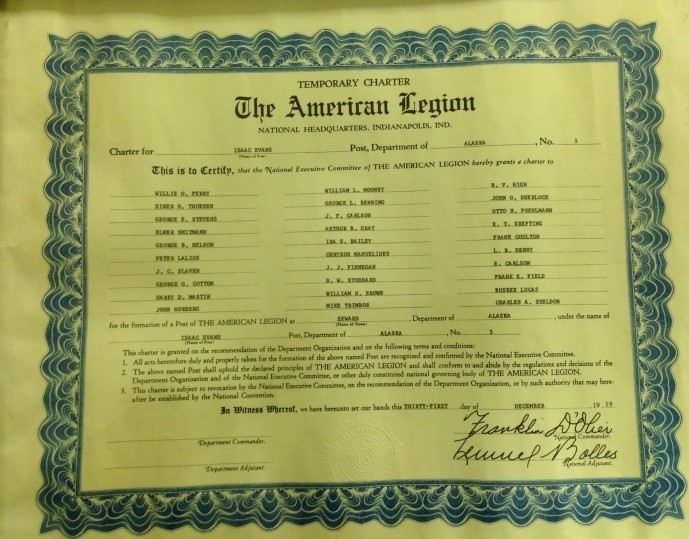
As we begin to tell our story of Seward Post #5, I want to extend our post's sincere appreciation to Son's member Doug Capra. Doug is an accomplished writer and historian. He came to Alaska in 1971 from Massachusetts, and taught in the Aleutian Islands and in Seward. He retired after 24 years of teaching, then spent 17 years as a National Park Ranger at Kenai Fjords National Park. Doug has served on the board of the Alaska Historical Society. In addition to his books, articles and plays, he has written forwards for two books by American artist Rockwell Kent. He also works as a naturalist aboard cruise ships. He has a B.A. and M.A. in English from Northeastern University. He lives in Seward, Alaska with his wife Cindy. We are indebted to Doug for all his work on putting together our post's history, and fortunately for us he recently published it in our local newspaper - the Seward Journal. We now have the ability to share our story. And now to the begining...
As soldiers returned home from the war, they not only faced employment problems but also the enormous cost of living, which was 77 percent higher than it had been before the Great War began. In early 1920, it would be 105 percent higher. Food cost 84 percent more, clothing 114 percent. Throughout 1919, inflation averaged 14.6 percent. By early 1920 it had improved, but still averaged 9 percent. To say the least it was incredibly tough on Americans in general but it was particularly tough on all those who went to war and had to deal with the horrors of war. Many of the returning combat veterans couldn't explain their experiences and throughout the country and the media fed on all the reports from the war. How does one explain to the "civilian" the fear of the orders to "go over the top" not knowing what they'd be hit with. How does one explain the choking, burning gas attacks; the stench of the battlefields littered with decomposing horses and human bodies from years earlier; miles of trenches and barbed wire covering the shattered landscapes. Veterans had only their fellow soldiers - where a grunt, phrase, nod or gaze could communicate and experience that couldn't be put into words. Veterans surviving the war saw the impact on their fellow veteran and saw the need to help their comrades in arms. In March 1919 the veterans from the American Expeditionary Force met in Paris and formed the first American Legion Caucus and the National organization of The American Legion was born. And, shortly after Armistice Day in 1919, Seward would form its own American Legion Post. As early as July 1919, William Mooney put out in the Seward Gateway Newspaper for people who served in the Armed Forces to meet and form an organization to be affiliated with the American Legion. On November 19th, the Seward Gateway announced on its front page "WILL ORGANIZE AMERICAN LEGION HERE TOMORROW." The meeting would be held at 8 pm. at Town Hall. "All former service men, Army, Navy, etc., are asked to turn out," the newspaper urged, "and show the remainder of Alaska and those in the states that in the Northerners have done, they have gone over the top and will perfect an American Legion that will be a hummer." The Isaac Evans Post of the American Legion was formed on November 20th with a formal application to the National organization with a charter list of 23 names. This was the beginning of our post and right from the beginning the post took an active role in the community, holding dances and sponsoring many patriotic events throughout the years.
The Isaac Evans Post was officially formed after the approval of the application that was submitted by 23 charter members and the post received it's temporary charter with a date of December 31st 1919. What a great way to start the post's history! There was even more interesting events surrounding the naming of the post as Isaac Evans was not a military man but a US Marshal who, prior to his brutal murder by a notorious criminal in Alaska by the name of William Dempsey, was part of the early community's fabric in this vibrant and new Alaskan coastal town!
